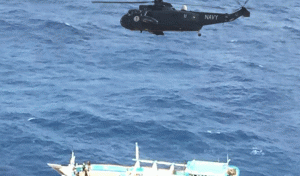The operation is a big question mark on India’s long-standing claim as a net security provider in the Indian Ocean Region (IOR)
On June 18, 2025, Pakistan navy, as part of its humanitarian mission rescued an injured Indian crew member from an oil vessel in the Arabian Sea. Though this incident seems minor in the evolving geopolitics of Indian Ocean, yet it potentially impacts the regional maritime order and the evolving nature of naval power in contemporary era. This remarkable act of humanitarianism, specifically at a time of increased rivalry and direct confrontation between India and Pakistan, deserves appreciation outside diplomatic protocols and military communications.
In the official statement by ISPR claims operation was “a demonstration of Pakistan navy’s capacity to surpass nationalism and meet international marine obligations”. This statement is not merely a claim because the rescued crew member was not the national of a friendly state rather it was Indian national, with whom Pakistan has a history of rivalry and wars. Quite recently faced unprovoked aggression from India on international borders and LOC. Still Pakistani forces are on high alert as the threats of a renewed aggression from India cannot be denied. Amidst such situation such operations by Pakistan Navy are solely based on its respect for human life and international law. In maritime domain conventionally viewed through the prism of militarization, deterrence and contestation for sea dominance, such move highlights the critical but often disregarded concept of “humanity at sea”. Though many international treaties like United Nations Convention on Law of Sea UNCLOS (1982) and International Convention on Marine Search and Rescue Activities (1979) encourage such humanitarian activities. But dichotomy exists between the written international laws and level of their implementation. The prompt and readily response by the Pakistan navy shows the moral superiority and level of commitment Pakistan have for the international law.
In addition to demonstrating itself as a responsible state, this particular operation also adds to Pakistan’s evolving position in the Indian Ocean specifically in the Arabian Sea. In presence of the giant regional navies especially that of India, Pakistan navy is merely viewed as a coast guard by most of the international community. Through this operation Pakistan navy successfully demonstrated the fact that it is capable of providing security to the regional states in the hour of need. It also strengthens the operational capabilities of Pakistan navy to indulge in humanitarian aid, anti-piracy patrols beyond its maritime borders.
This operation is also a big question mark on India’s long-standing claim as a net security provider in the Indian Ocean Region (IOR). For long India through its port access, training, technical support, disaster relief operations and security patrols, claims to ensure security of all the littoral states against traditional and non-traditional threats. During the incidents (like that of June 2025) where human lives are at risks a quick and reliable response was expected from the claimant. But the ground reality narrates the opposite story, India (despite having a larger naval force and maintaining a larger strategic foothold in the IO) stayed out of this episode while Pakistan took the lead and saved a human life. This episode highlights the gap between India’s claimed strategic objectives and its response to humanitarian crisis. In a world full of power-hungry states, Pakistan established itself as a torch bearer of humanitarianism.
Shaped by the Blue-Water Navy ambitions of India, US strategic designs to contain China and Beijing’s counter moves, Indian Ocean became the central stage for the great power rivalry. Amid such scenario, Pakistan navy’s act of maritime benevolence act highlights the need for ethical naval conduct in the ocean.
Lastly, I will conclude by saying that “capability” without “credibility” is just flux and “power” without “ethics” only leads to jingoism, which will ultimately engender global peace.


